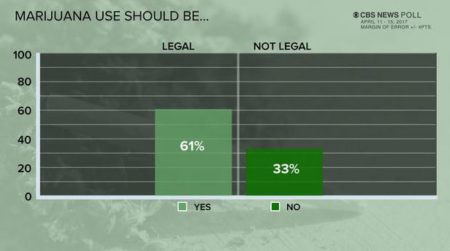There were several recent public opinion polls showing support for legalizing marijuana at its highest point.
First up is a Quinnipiac University National Poll which reported that 60 percent of US voters believe that “that the use of marijuana should be made legal in the U.S.,” the highest level of support for legalized marijuana in a Quinnipiac University national poll.
94 percent of voters also support “allowing adults to legally use marijuana for medical purposes if their doctor prescribes it” also the highest level of support in any national poll by the independent Quinnipiac University.
The Quinnipiac University National Poll reported that 73 percent of voters oppose government enforcement of federal laws against marijuana in states that have legalized medical or recreational marijuana. No group of voters supports enforcement in states where marijuana is legal.
76 percent of voters support reducing the classification of marijuana as a Schedule I drug, the same classification as heroin. Again, all groups support this reduction.
The other poll is from CBS News which also shows support for legalizing marijuana is higher than ever. Here are some highlights…
61 percent of Americans think marijuana use should be legal. Even most Americans who oppose legalizing marijuana in general think medical marijuana use should be allowed.
Three in four adults between 18 and 34 support legal marijuana use, as do six in 10 Americans between 35 and 64. Most Democrats and independents increasingly think marijuana use should be legal, while Republicans are divided. Men and women are equally in favor of legal marijuana.
71 percent of Americans oppose the federal government’s efforts to stop marijuana sales and its use in states that have legalized it. This opposition cuts across party lines – the majorities of Republicans (63 percent), Democrats (76 percent), and independents (72 percent) oppose the federal government trying to stop marijuana use in these states.
Most Americans view marijuana as safer than alcohol.

